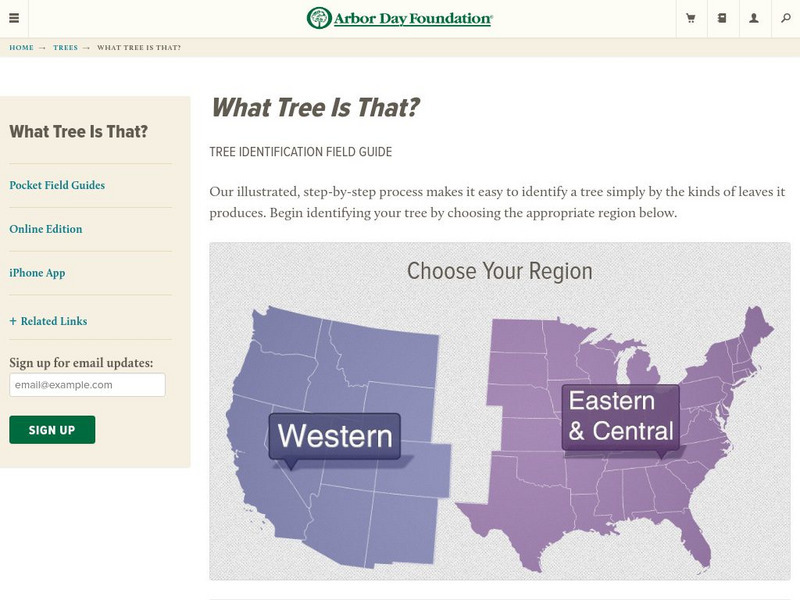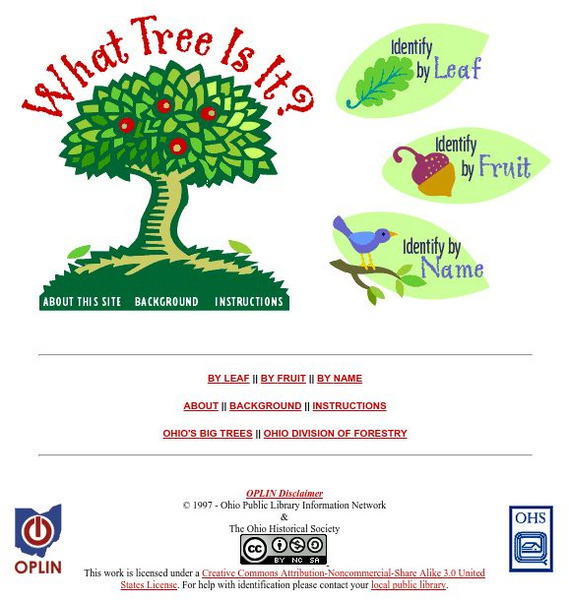National Wildlife Federation
Tree Detectives!
Trees may look pretty similar until you take a closer look. Young scientists use their observation skills to describe the difference between the bark, leaves, and seeds of different trees. They then use a field guide to identify local...
Purdue University
Tree Talk
Examining tree rings shows more than just age. The third installment of a five-part Family Nature Program unit has learners examine all parts of trees including tree rings to tell stories about the life of the tree. They then use their...
Curated OER
Forest Fun
Young scholars explore orienteering and how to use a compass. They explore the importance of forests and identify some of the trees in a local forest.
Curated OER
Comparing Deciduous and Evergreen Trees
Students investigate nature by identifying different plants and trees. In this environmental field trip, students participate in a British Columbia expedition in which they identify cedar, pine, hemlock and Douglas fir trees. Students...
Curated OER
Cherokee Leaf Printing
Young scholars investigate their local creeks and forests and practice identifying trees. For this ecology identification instructional activity, students utilize a pad and pencil while on a field trip near their school and...
Curated OER
Charting the Changes in Our School Forest
Fourth graders investigate the ecosystem and how forests are disappearing. In this environmental protection lesson, 4th graders analyze the changes in their school for 2 weeks. Students practice identifying trees, birds, and...
Curated OER
Leaf ID and Leaf Bingo
Third graders explore the parts of a leaf and use a dichotomy key to identify leaves. For this biology lesson, learners study characteristics of various leaves and play a game of bingo to identify leaves by their traits. Students find...
Curated OER
Keys To Trees: Dichotomous Tree Identification
Ninth graders gather samples of different tree leaves in their neighborhoods, and on school grounds, and identify several species of common South Carolina trees using leaf and growth characteristics with aid of dichotomous key.
Curated OER
Dress Up a Twig
Learners study the structure and function of the parts of a winter twig. They determine how to identify trees using the twigs.
Curated OER
Look At Those Leaves!
Students explore botany by researching plants in class. For this tree identification lesson, students examine a group of leaves and list the different characteristics before guessing what types of trees they came from. Students read...
Curated OER
Forest Ecosystem Field Trip
Pupils investigate the environment by participating in a class field trip. In this botany lesson, students attend a field trip through their local park or forest while listening to a nature guide. Pupils practice using their 5 senses and...
Curated OER
Tree Identification
Students list four ways to identify trees. In this tree identification instructional activity, students use tree identification techniques such as leafs, bark, wood grain, soil type, and climate to create tables and graphs.
Curated OER
Tree Identification to Observe Diversity of a Given Nature Area
In this tree identification lesson, 2nd graders read A Tree is Growing, discuss what makes up a forest, brainstorm characteristics of leaves, gather samples of leaves and examine their samples. Students will sort leaves and compare them...
Curated OER
Create a Community Tree Tour
Students study tree identification. In this tree identification lesson plan, students design and assemble a tree tour booklet describing 5 trees found in their community. The booklet should feature common and Latin names of the species,...
Curated OER
DRASING NATURE
Students take samples of local trees and identify the tree using a field guide. They keep data for the tree on the Tree ID sheet. They create leaf, seed, bark, and flower prints and paint them.
Curated OER
How Do We Know Which Trees to Tap?
Students examine tree identification keys to identify maple trees for sap tapping. They interpret tree identification keys and mark maples that can be used for sap harvesting. They take digital pictures of the trees they identify.
Missouri Botanical Garden
Missouri Botanical Garden: Temperate Deciduous Forest Leaf Identification
You identify deciduous trees by the shapes of their leaves. Link to complete tutorial on types of leaves.
Other
North Dakota State University: A Guide to Deciduous Tress
Tutorial on deciduous tree identification. Diagrams and descriptions of the four major deciduous tree groups.
Other
The National Arbor Day Foundation: What Tree Is That?
Imagine a world without trees. Students can click on a barren field to see the transformation of the bare dirt by plants and trees. The authors include an online reference guide that lists the benefits of trees and an excellent...
Environmental Education for Kids
Eek!: Evergreens
Site chronicles Wisconsin's Evergreen and Conifer trees. There are descriptions of the various tree types. Additionally, site details the uses of these trees in nature. Ideal for grades 4-8.
Science Education Resource Center at Carleton College
Serc: Mn Step: Schoolyard Trees: Creating a Field Guide for Your School
An interesting activity where students observe and identify the trees in the schoolyard, then create a field guide for others to use.
Other
Ohio Public Library: What Tree Is It?
An online resource for tree identification by common name, scientific name, leaf, or fruit.
Oregon State University
Oregon State University: Dichotomous Key
An excellent starting point. Get a good description of what the dichotomous key for tree identification is and then directions for using it to identify trees.
Science Education Resource Center at Carleton College
Serc: Mn Step: Why Are Trees Important?
After reading about trees and having a class discussion, learners go to a local park to observe trees and collect leaves. Back in class, the leaves are sorted and identified to see what tree types are most common. Additional ideas for...























